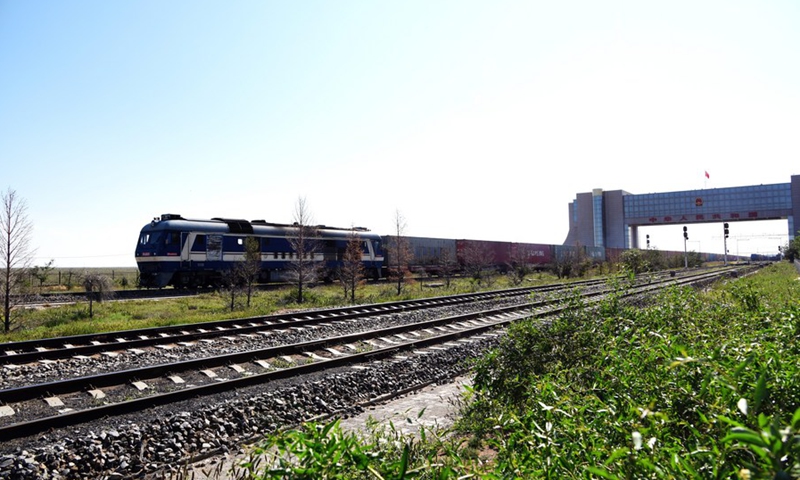China’s economic rebound ‘vital to countries along BRI’
By Wang Bozun Source: Global Times Published: 2020/11/22 19:23:40

A China-Europe freight train runs through the national gate at Erenhot Port in north China's Inner Mongolia Autonomous Region, Sept. 4, 2020. (Xinhua/Lian Zhen)
China's rapid economic rebounding from the pandemic is beneficial to the economic recovery of countries and regions along the Belt and Road Initiative (BRI), and in the post-pandemic period, building green BRI will be vital to address global warming.
Former Philippine president Gloria Macapagal Arroyo made the comment at the 17th International Financial Forum in Guangzhou, South China's Guangdong Province on Sunday.
From providing medical supplies and affordable COVID-19 vaccines, to sharing the experience of fighting the infectious disease, to exporting daily supplies to economies along the BRI, China's rebounding economy can play a role in helping these markets to recover, Chinese experts and economists told the Global Times.
Through building the green BRI, China, as a developing country, could share an emissions reduction model that is suitable for other developing countries, they said.
"The BRI has provided efficient channels, such as China-Europe freight trains, for countries to import medical supplies from China when they were not able to produce enough PPE," Wang Yiwei, director of the Institute of International Affairs at the Renmin University of China, told the Global Times on Sunday.
According to data from China's railway authority, in the first half of the year, China-Europe freight trains transported more than 27,000 tons of medical supplies including face masks to European countries.
"Unlike many private pharmaceutical companies in some Western countries whose COVID-19 vaccine prices will be relatively high, China's more affordable vaccines could help ease the pandemic in these BRI countries," Wang said.
The pandemic has caused severe economic recessions in many countries, as they had to suspend or curtail economic activity to prevent its spread. However, China, which has largely controlled the virus, saw its third-quarter GDP growth 4.9 percent over last year.
"Unlike global economic recessions in the past, the pandemic has had a more severe impact on the supply side than on the demand side globally, so the sooner a country can control the pandemic, the quicker the recovery it can attain," Tian Yun, vice director of the Beijing Economic Operation Association, told the Global Times on Sunday.
In the third quarter of this year, China's exports reached 5 trillion yuan ($762 billion), a 10.2-percent increase year-on-year and a record high for a single quarter, according to data from China's government website.
"The increased exports show that China's timely production resumption has helped those countries that halted factory production but still have demand," Tian noted.
In addition to an economic recovery, building the green BRI is also vital to solve the issue of global warming, former South Korean prime minister Han Seung-soo said at the forum.
"In the post-pandemic period, building the green BRI is necessary... I hope the BRI could also extend toward the east to major carbon-emitting countries including South Korea and Japan. Jointly building the green BRI is significant to address global warming," Han said.
"China's carbon emissions reduction plan mainly targets factory pollution, which is more suitable for developing countries, which account for a major percentage of the world's total population," Wang said.
"So, building the green BRI is significant in addressing global warming as most BRI participants are developing countries," Wang said.
Posted in: ECONOMY